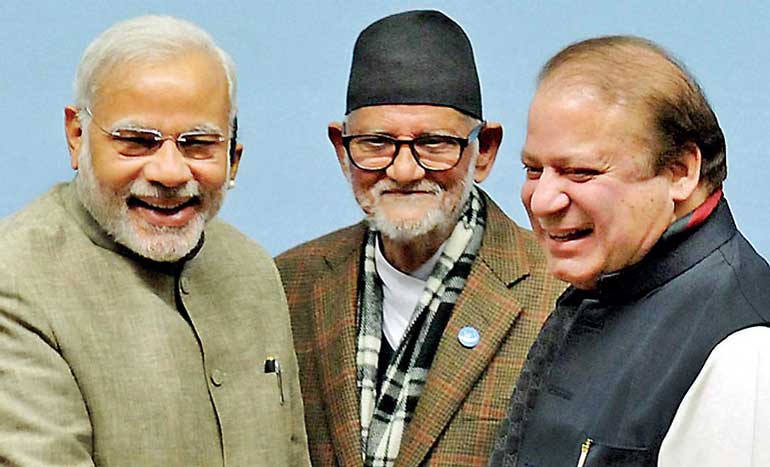Friday Feb 13, 2026
Friday Feb 13, 2026
Saturday, 31 March 2018 00:00 - - {{hitsCtrl.values.hits}}

The fate of the 19th Summit of the South Asian Association for Regional Cooperation (SAARC) hangs in the balance.
The 19th Summit was to have been held way back in November 2016, but had to be postponed indefinitely because India boycotted it complaining of attacks by Pakistan-based terror groups on Indian military bases in Pathankot and Uri. Other members like Bangladesh, Afghanistan, Sri Lanka and the Maldives followed suit for their own reasons.
According to the SAARC charter, the heads of government of the eight member States should meet once year. But this has not been observed to the letter. And between 1998 and 2002, no Summits were held, again because of India-Pakistan conflicts.
This time round too, India-Pakistan bilateral issues appear to be stalling Pakistan’s efforts to hold the 19th.Summit. It is Pakistan’s turn to hold the summit. But while Pakistan insists that it is the legitimate venue, India has a major issue with that claim because, in its view, there has been no let-up in cross-border terrorism sponsored by Pakistan since 2016.
And if India decides to boycott a Summit held in Pakistan, the summit cannot be held as the charter requires the representation of every member State.
But Pakistan, looking for a role in South Asia (basically to contain India), is working assiduously but quietly, to garner support for holding the Summit and holding it in Islamabad as scheduled earlier. Pakistan sees SAARC as a forum which will help it face India in conjunction with the rest of the members, who also have issues with India.
On Thursday, at the Pakistan National Day function in Colombo, High Commissioner, Dr. Shahid Ahmad Hashmat gave primacy to SAARC in his speech. Stressing the need for member States to pool in efforts to strengthen SAARC, he said: “SAARC is needed for political and economic cooperation in South Asia.”
Hashmat also said that Pakistan’s relations with Sri Lanka are based on “mutual respect and not mutual interest”, thereby hinting that cold interest based on real politik should not be the only criterion for having bilateral and multilateral ties.
Janjua’s visit
Significantly, Pakistan’s Foreign Secretary, TehminaJanjua, chose to visit Sri Lanka first after taking over the post at the end of 2017. At her meeting with President Maithripala Sirisena, Janjua extracted a promise that Sri Lanka would support Pakistan’s stand on the summit.
Janjua’s visit to Colombo came a day after Pakistan scored an important victory at the UN, when it got a seat at the UN Human Rights Council thanks to Sri Lanka’s support. Pakistan was grateful to Sri Lanka for sending its cricket team to play in it after a long gap. There had been no visit by a Sri Lankan side to Pakistan since the terrorist attack on it in 2009.
“We are delighted that the Sri Lankan team is visiting Lahore. Pakistanis will cheer the Sri Lankans as much as their own team,” Janjua said, immensely pleasing her Sri Lankan audience.
 Subsequently, the Pakistani President, Mamnoon Hussain, invited President Sirisena to visit Islamabad and the latter obliged him in March this year. During the visit, President Mamnoon personally came to the airport to receive Sirisena as a 21-gun salute boomed.
Subsequently, the Pakistani President, Mamnoon Hussain, invited President Sirisena to visit Islamabad and the latter obliged him in March this year. During the visit, President Mamnoon personally came to the airport to receive Sirisena as a 21-gun salute boomed.
In his meeting with Sirisena, Pakistani Prime Minister Shahid Khaqan Abbasi, said that Pakistan is committed to the SAARC process and urged the Sri Lankan President to “play his role for the early convening of the SAARC Summit in Islamabad.”
Though it is not clear if President assented to the Pakistani request (the press communiqué gave no clue), it is likely that he would make the necessary efforts given Sri Lanka’s traditionally friendly ties with Pakistan. But diplomats caution that often, in such matters, Colombo finally tends to look to New Delhi for the cue, as ties with India are far more important to it.
And India’s stance on Pakistan has only hardened since 2016. Only recently, there had been a row over the surveillance mounted on their diplomats. The Pakistani Ambassador had even left New Delhi indicating growing discontent.
With the Indian Parliamentary elections due in May 2019, the hardline Bharatiya Janata Party-led government could tweak its anti-Pakistan posture further, in the hope of getting the Indian nationalistic vote in a closely fought election. During the Gujarat and Uttar Pradesh State Assembly elections, BJP leaders had dubbed the rival Congress Party a “stooge” of Pakistan and declared that the latter’s victory would be “Pakistan’s victory”.
India’s moves
But India too has been cultivating the Sri Lankan leadership. President Sirisena was given a prominent place in the international solar summit held in Delhi. And out of respect for India, Sirisena made the visit to New Delhi on March 11 even though there had been communal clashes in Kandy district between 2 and 10 March.
Problematic Nepal
While close allies Afghanistan and Bhutan are expected to go along with India on the SAARC issue, Nepal is likely to exercise independence, given the fact that communist Prime Minister K.P. Oli and his Maoist ally, Pushpa Kamal Dahal “Prachanda” are not as well disposed towards India as the traditionally pro-India Centre-Left party, the Nepali Congress.
Softening Maldives
The Maldives could have go the Pakistan way, given its contradictions with India since Abdulla Yameen became President in 2013. But Maldives-India relations have recently improved with Yameen trying to reach out to New Delhi, and New Delhi’s pledging not to militarily intervene in the Indian Ocean archipelago where Yameen is locked in a no holds barred conflict with the opposition.
Bangladesh implacable
Bangladesh too is expected to oppose the location of the summit in Islamabad because Sheikh Hasina’s regime in Dhaka continues to be bitterly anti-Pakistan.
Parliamentary elections due in Bangladesh in July 2018. With the opposition Bangladesh Nationalist Party (BNP) likely to contest and not boycott as it did the last time, Sheikh Hasina could well queer the anti-Pakistani nationalistic pitch. In fact, on 25 March, ‘Genocide Day,’ Hasina told a rally that “those Bangladeshis living in independent Bangladesh who love Pakistan should be punished.”
Special Bangladeshi courts had sentenced pro-Pakistani leaders to death for their alleged role in the 1971 killings carried out by the Pakistani forces and their local allies.
Dangers in blocking continuously
But the question that remains to be answered is: Can India continue to block the SAARC summit being held in Islamabad, without losing its moral authority in the grouping which its neighbours consider important?
Some observers feel that the current crisis will blow over as the 1998-2002 crisis did. The four-year gap between the 1998 and the 2002 Summits created by an India-Pakistan row, did not destroy SAARC. And when the wheels of cooperation started moving again after 2002, SAARC achieved much.
Others say that SAARC has already been downgraded by India which is now looking to have closer links with regional organisations which do not have Pakistan as a member, such as ASEAN and the Bay of Bengal Initiative for Multi-Sectoral Economic Cooperation (BIMSTEC). It is trying to linkup with Iran and Central Asia through the Indo-Iranian Chabahar Port.
But there are commentators who decry downgrading SAARC. As a former Sri Lankan diplomat said: “SAARC has a lot of achievements to its credit, in as much as, it has been the only all South Asian forum since the 1980s. It has brought people and technical experts of the region together to work towards common goals. BIMSTEC on the contrary is yet to take off though it has been in existence since 1997.”
And wrecking SAARC through the continuous postponement of the summit will only further alienate India from its South Asian neighbours, who see value in SAARC,” the former diplomat added.